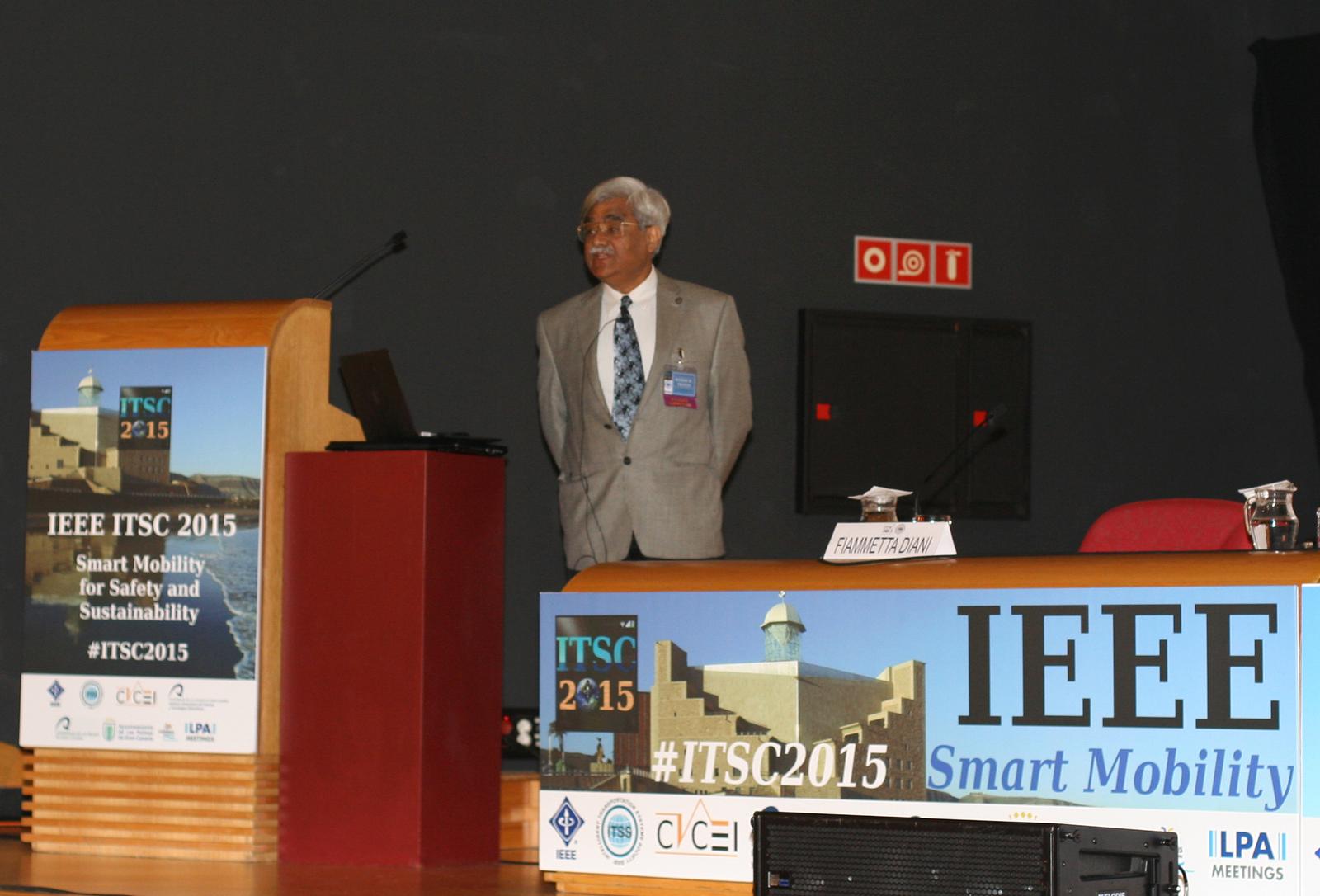Laboratory for Intelligent and Safe Automobiles Receives IEEE Award
San Diego, February 2, 2016 — The Laboratory for Intelligent and Safe Automobiles (LISA) at the University of California, San Diego, led by electrical engineering professor Mohan Trivedi, received the IEEE Intelligent Transportation Systems (ITS) Institutional Lead Award for 2015. Trivedi is a longtime academic participant in Calit2 and its Qualcomm Institute, including as Calit2's inaugural layer leader for Intelligent Transportation at UCSD when the institute was founded in 2000.

The award, administrated by the IEEE Intelligent Transportation Systems Society, is given annually to research teams around the world that have demonstrated exceptional leadership in promoting and developing significant ITS technologies. The IEEE ITS Institutional Lead Award was presented to Professor Trivedi at the 18th IEEE International Conference on Intelligent Transportation Systems in Las Palmas de Gran Canaria, Canary Islands, Spain.
In his award acceptance talk, Trivedi shared his team’s journey towards developing human-centric intelligent and safe vehicles. “When we talk about intelligent automobiles, what does it mean? Does it mean autonomous self-driving robots, or something else?” he asked. He also asked what role humans will play in the autonomous vehicles of the future. For example, how would humans be required to interact with or take control of the vehicle, and would they trust their robotic vehicles completely?
LISA’s vision for intelligent vehicles is what Trivedi calls a distributed cognitive system, in which humans and robots cooperate with each other, rather than compete with each other. “This distributed cognitive system should be able to learn and execute perceptual, cognitive and motor functions in a synergistic manner, where humans and machines both understand the strengths and limits of one another,” said Trivedi.

Over the last 15 years, LISA researchers have developed technologies to monitor and understand what’s happening both inside and outside cars on the road. The team equips its vehicles with cameras and other sensors to observe the movement of the driver’s head, eyes, hands and feet and to monitor the surrounding traffic. They then use these data to develop machine vision and machine learning algorithms that can learn the driver’s patterns and predict the driver’s intended maneuvers a few seconds before they happen.
“LISA has been very active for years in the field, promoting innovation in the field of intelligent vehicles, which indeed includes perception of the road environment and intelligent decision making,” said Alberto Broggi, computer engineering professor at the University of Parma in Italy and former president of the IEEE ITS Society. Broggi also serves as the General Manager at VisLab, recipient of the 2008 IEEE ITS Institutional Lead Award.
“The laboratory led by Professor Trivedi played an important role in the ITS arena since the researchers and Professor Trivedi himself contributed a large number of scientific papers to the ITS community. Many key people currently involved in vehicle perception and automation have been scholars within LISA; some of them are also playing an active role in the IEEE ITS Society,” said Broggi.
An alumnus of Trivedi’s research group, Brendan Morris, who is now an electrical engineering professor at the University of Nevada, Las Vegas and Vice President of the IEEE ITS Society, said that the mentorship he received working in LISA was invaluable in shaping his career. “Thanks to Dr. Trivedi and the LISA lab, I was able to work on exciting projects with leaders in the auto industry and get hands-on experience developing ‘real’ advanced driver assistance systems solutions that not many students get. The group is dynamic and promotes productivity.”
Moving forward, LISA researchers are developing intelligent driver assistance systems that assess when it’s safe to merge, brake, change lanes, accelerate and decelerate. So if drivers take their eyes off the road and begin swerving, cars could momentarily take control of steering and braking to avoid obstacles and collisions. Trivedi announced that these intelligent assistance features will be installed in the Audi A8 in 2017. Other versions of these systems are also being adopted for consumers in Asia and Europe.
“These things are now becoming practical and at the same time new exciting research challenges are emerging, as vehicles would be driving mostly in an autonomous mode,” said Trivedi. “These vehicles will have to understand various factors: when and how to engage humans in controlling the vehicle in case of an emergency; the readiness of an occupant to take control; the gestures and intentions of humans in the car and on the streets; and how to safely and smoothly move around vehicles which are driven in the old-fashioned way.”
Media Contacts
Liezel Labios, (858) 246-1124, llabios@ucsd.edu
Related Links
Laboratory for Intelligent and Safe Automobiles
Electrical and Computer Engineering

